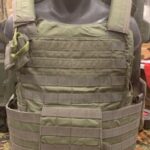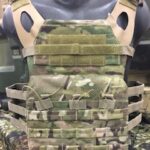NIJ Certification
MINIMUM REQUIREMENTS FOR BODY ARMOR
The NIJ standard specifies what the minimum requirements are for body armor that have undergone their performance and testing protocols and rates the various types of available body armor according to the threat levels they offer protection against.
When body armor is undergoing testing, self-regulating NIJ-certified laboratories put the body armor through a number of different tests to ensure they meet NIJ code and performance standards.
The NIJ has the authority to retest body armor that the manufacturer is already selling on its floor to ensure that the performance standards remain up to code as time passes. This is just part of the NIJ’s excellence and audit procedures.
The NIJ’s performance standards means that commercially available body armor meets the minimum performance requirements they set forth. The NIJ publishes their ballistic and stab resistance standards for personal body armor, as you can see here by clicking on these links. An overview of both the NIJ 0101.04 and the NIJ 0101.06 Standards can be found below.
NIJ 0101.04 STANDARD
Table Ballistic Requirements Penetration / Back Face Signature NIJ 0101.04

NOTES NIJ 0101.04 STANDARD
- Backing is conditioned Roma Plastilina® nr. 1
- Bullet manufacturer is not specified
- All armor panels (including carriers) will be sprayed during three minutes on both sides before testing
- Shape of impact pattern is given, shot 4 and 5 have an impact angle of 30 degrees
- Minimal distance to edge of sample is 76 mm
- Minimal distance to previous impacts is 51 mm
NIJ 0101.06 STANDARD
Table Ballistic Requirements Penetration / Back Face Signature NIJ 0101.06

NOTES NIJ 0101.06 STANDARD
- Backing is conditioned Roma Plastilina® nr. 1
- For certification Level IIA, II and IIIA, 28 complete vests must be provided
- For Level III certification, nine armor inserts are required
- For Level IV certification, 7 to 37 armor inserts are required
- All new vests and hard armor plates will be immersed for 30 minutes before testing starts. As per
section 7.8.2 NIJ STD 0101.06. - Bullet manufacturer is specified




